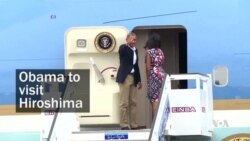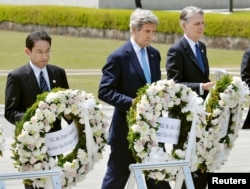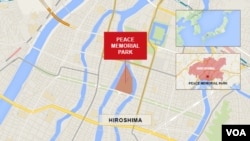President Barack Obama plans to visit Hiroshima, Japan, May 27, becoming the first sitting U.S. president to go to the city where an American warplane dropped the world's first atomic bomb in 1945 during World War II.
For seven decades, no American president has visited Hiroshima and Nagasaki, where a second A-bomb was dropped three days later. The dropping of the bombs followed Tokyo's surprise aerial attack on the U.S. naval base at Pearl Harbor, Hawaii.
The White House said Obama would visit Hiroshima, with Japanese Prime Minister Shinzo Abe, near the end of a May 21-28 trip to Vietnam and Japan. Obama is scheduled to be in Japan for a meeting of leaders of the Group of Seven, the world's leading economies.
Obama adviser Ben Rhodes ruled out the possibility that the president would apologize for the bombing of Hiroshima and Nagasaki. Rhodes said the president "will not revisit the decision to use the atomic bomb at the end of World War II. Instead, he will offer a forward-looking vision focused on our shared future" with Japan.
WATCH: Obama to Visit Hiroshima
At Tuesday's White House briefing, press secretary Josh Earnest was asked why the president was ruling out an apology. Earnest said the president wanted to highlight the "remarkable transformation" in relations between the two countries, with Japan now one of the United States' closest allies. This would have been unimaginable 70 years ago, he said.
Earnest said the president does believe that the United States bears a special responsibility for being the only nation to ever use a nuclear weapon. Pressed on whether Obama would have made the same decision to drop atomic bombs as then-President Harry Truman, Earnest said he thought Truman made the decision for the right reason: to end a terrible war, saving countless lives. Earnest also said present and future generations owe a debt of gratitude to American World War II veterans, often referred to as members of "the greatest generation," for prevailing.
The White House said Obama would visit Hiroshima to "highlight his continued commitment to pursuing the peace and security of a world without nuclear weapons."
Brian Harding, director of East and Southeast Asia policy for the Center for American Progress research institute, told VOA in an interview Tuesday that "I think he [Obama] sees this as an incredibly symbolic step to bring some further closure to the wounds of World War II and also an opportunity to bookend his 2009 Prague speech, in which he called for a world free of nuclear weapons."
Harding said he agreed with the White House that the relationship between the U.S. and Japan was already extremely close: "I actually would not overestimate the importance of this visit for U.S.-Japan relations. I think the state of the U.S.-Japan alliance is a demonstration of just how far we've come and how much reconciliation there has been between the United States and Japan. When United States senior foreign policy leaders look around the world, it's hard to find a closer, more important friend than Japan already."
Harding said the president's planned visits to Japan and Vietnam would both be a testament to the power of reconciliation. Obama will visit Hanoi and Ho Chi Minh City before traveling to Japan. Obama will push for passage of the Trans-Pacific Trade Partnership during the tour.
Secretary of State John Kerry visited Hiroshima last month and said the memorial there, just steps from ground zero, "is a stark, harsh, compelling reminder, not only of our obligation to end the threat of nuclear weapons, but to rededicate all our effort to avoid war itself."
"War must be the last resort, never the first choice," Kerry wrote in a memorial book at Hiroshima. "This memorial compels us all to redouble our efforts to change the world, to find peace and build the future so yearned for by citizens everywhere."
Atomic bomb drop
The two U.S. atomic bombs dropped on the Japanese cities hastened the end of World War II, since Japanese Emperor Hirohito announced his country's unconditional surrender on August 15, 1945, nine days after the Hiroshima blast.
No atomic bombs have been detonated during a conflict since then, and the world has long debated the extent of the nuclear stockpiles believed to be held by 10 countries around the world.
On orders from President Harry Truman, an American B-29 bomber dropped the A-bomb, known as "Little Boy," over Hiroshima. It immediately wiped out 90 percent of the city and killed 80,000 people. Tens of thousands more would later die of radiation exposure.
The Nagasaki bomb, dubbed "Fat Man," immediately killed an estimated 40,000 people, and another 20,000 to 40,000 in the ensuing months.
VOA's Ken Bredemeier contributed to this report.
Storify: How Twitter reacted to news of Obama's Hiroshima visit








